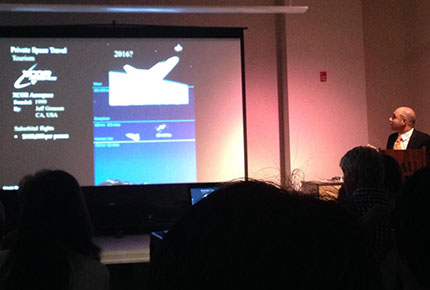Private space travel: the next frontier
Alumnus Tony Faddoul gives a lecture at LAU NY on contemporary trends in space exploration.
Fifty years ago this week, U.S. astronaut Edward White became the first American to walk in space. Space travel was in its infancy and the world was captivated by it. Millions followed White’s voyage, tracking his every move during the 23 minutes he spent floating outside the space capsule. Today, the space landscape looks quite different, as private space travel companies are making the once otherworldly accessible to anyone who can afford it.
During a lecture titled “Private Space Travel Projects: From Lebanon to Texas” at LAU NY, alumnus Tony Faddoul talked about how private enterprises have been ushering in an age of commercial and touristic space missions.
An architect, designer, artist, futurist and storyteller, Faddoul has worked on many private space travel projects and says the privatization of space has many upsides.
“When NASA shut down the shuttle program (2011) and decided to contract everything to the Russians, it was a huge savings. One launch of the shuttle used to cost a billion dollars,” he said, money that NASA could spend on research rather than operational costs. Additionally, because private companies are trying to remain competitive, they are often able to advance the technology at a faster pace than governments can.
“Privatization also makes space travel more accessible to a wider range of people,” Faddoul told the captivated audience, which included both astrophysicists and fashion designers. He did say, though, that space tourism still carries a hefty price tag of between $100,000-$250,000 per person.
Yet another benefit of the trend is an increase in byproducts from space. The charcoal inside water filters today is just one example of a NASA technology-derived product.
While the old superpowers used space travel programs to compete during the Cold War, Lebanon had its own, little-known claim to space travel fame.
In the 1960s, a group from Haigazian College was among the first to venture into space amid the race between the United States and the Soviet Union. Between 1961 and 1966, Professor Manoug Manougian and his students privately funded, designed, built and launched multi-stage rockets that reached more than 63 miles above sea-level — beyond the Kármán line conventionally used as the start of outer space — and the same altitude that major space travel companies Virgin Galactic and XCOR set for their commercial flights today.
The Lebanese launch took place on private farmland, while today, private launching around the world uses governmental facilities. But that’s about to change. SpaceX plans to build the first private vertical launching site in Texas in 2018.
When it comes to private space travel, the sky is the limit, says Faddoul. Companies like Space Adventures, Ltd. will train civilians to become private astronauts. Then there’s the business of Spaceports (essentially airports for space), which will market facilities for commercial passenger launches. With a growing industry reliant on wealthy individuals, a luxury market is sure to flourish. One company is even working on a space beer.
“You don’t have to be in the military or work for the government to be able to go to space,” says Faddoul. “And you don’t have to wait for a governmental agency to build your rocket. That inspires endless opportunities for humanity where the sky is not the limit anymore.”
More
Latest Stories
- Into the Psychology of Justice
- Alumnus Zak Kassas on Navigation, Spoofing and the Future of GPS
- Hearing Between the Lines
- LAU Hematology Conference 2025: Advancing Science Through Interdisciplinary Exchange
- Dr. Chaouki T. Abdallah Invested as LAU’s 10th President
- LAU Guides Its Students Through the Code of Conduct
- Innovative Procedure at LAU Medical Center–Rizk Hospital Signals Hope for a Patient With a Congenital Disease
- LAU’s Inaugural PodChat Session Addresses AI Detection in the Classroom


